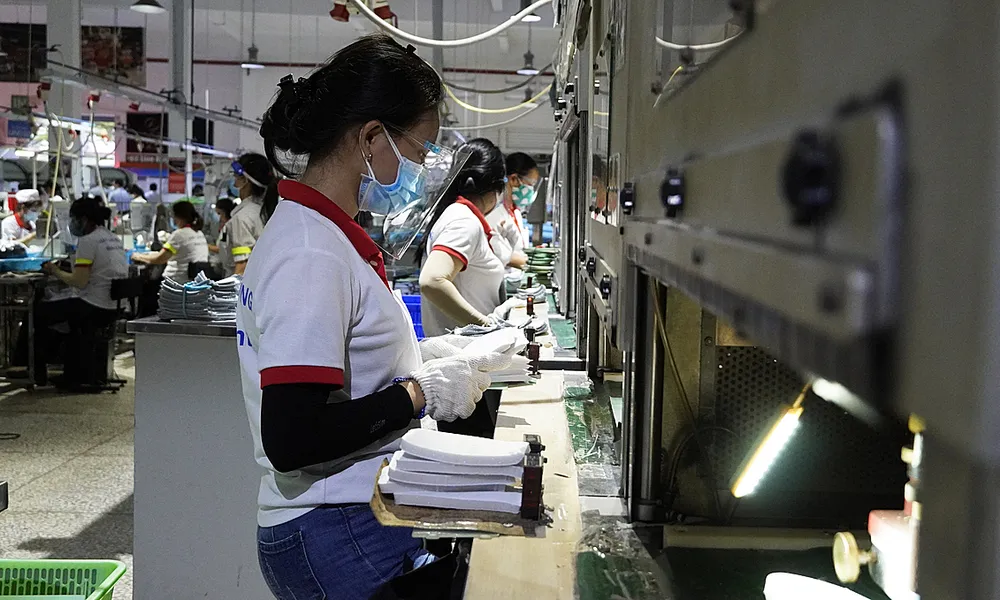
Glimmers of Hope
In discussions with Saigon Investment concerning the order status of garment industry enterprises during the final quarter of this year, Mr. Phạm Xuân Hồng, Chairman of the Ho Chi Minh City Textile, Embroidery, and Knitting Association, shared encouraging news. According to Mr. Hồng, the garment industry is experiencing positive signs, with order volumes rising by approximately 15% compared to the preceding quarter. Most businesses have secured orders, ensuring job stability for their workers. Nonetheless, these orders are relatively modest in scale and short-term in nature, featuring more intricate designs but lower price points. The garment industry anticipates further positive developments as the year draws to a close and enters 2024.
Similarly, the labor-intensive leather and footwear sector has witnessed encouraging signals regarding orders since the close of the third quarter. Mr. Nguyễn Chí Trung, Chairman of the Board of Directors of Gia Dinh Group Joint Stock Company, noted that his company's workers are currently working overtime to meet shipment deadlines. According to Mr. Trung, the US market, a key destination for Vietnamese leather and footwear, is displaying promising signs as inventories decrease, and the demand for Christmas and New Year imports steadily rises. Additionally, businesses have intensified their efforts to explore new markets such as South Africa, Asia, and even China, where Vietnamese enterprises can find ample export opportunities, making it the ideal time to reap the rewards.
Unlike the textile, garment, and footwear industries, which have been experiencing a boost, the agricultural and food product sectors only began showing signs of improvement in the last months of the year. Mr. Phan Minh Thông, Chairman of Phuc Sinh Group, which specializes in exporting deeply processed agricultural products, reported a growth rate of approximately 37% in the first six months of the year.
However, due to sluggish sales in the subsequent period, the forecast for fiscal year 2023 anticipates an 18% increase compared to the same period. Mr. Thông attributed this improvement partly to increased customer interest in the agricultural and food industries following the pandemic and partly to Phuc Sinh's proactive sales strategy. At one point, the Phuc Sinh team spent 4.5 months traveling the globe to promote their products, which are currently available in 102 countries worldwide.
In addition to export-focused enterprises, numerous domestic businesses are also looking forward to the year-end shopping season. Mr. Lương Vạn Vinh, General Director of My Hao Cosmetics Joint Stock Company, reported an uptick in the consumption of My Hao products since the conclusion of the third quarter. He expressed hope that the economic situation would brighten further in the fourth quarter, with consumers expected to increase their spending during the year-end shopping season, thereby bolstering company performance. Mr. Vinh acknowledged that achieving this year's initial goals might be challenging, but he is determined to make efforts to attain 90% of the set targets.
Persisting Challenges
While some industry groups have witnessed improvements in their situations, numerous challenges persist, affecting not only specific sectors but also businesses across the country, transcending Ho Chi Minh City's boundaries.
During a recent conference organized by the Ho Chi Minh City Business Association, held in the third quarter of 2023, representatives from various industries voiced ongoing concerns. Despite relative stability in the first quarter, a representative from the Ho Chi Minh City Rubber and Plastic Association reported a significant downturn in business activities during the second and third quarters. The industry anticipates a decline in revenue of 10-15%, potentially reaching as high as 30%, attributable to diminished export opportunities and reduced domestic purchasing power. Furthermore, cumbersome and stagnant administrative procedures have compounded the challenges, prompting the association to advocate for administrative reforms and measures to stimulate domestic consumption.
Likewise, representatives from the Ho Chi Minh City Handicraft and Wood Processing Association and the Binh Dinh Businessmen Club in Ho Chi Minh City disclosed that the wood processing sector had experienced a 30% drop in export turnover compared to the same period last year. Many import customers have faced financial difficulties, placing enterprises in a predicament where product prices remain modest while financial costs surge, exacerbating the vulnerability of Vietnamese companies in competing with foreign counterparts.
One persistent challenge repeatedly cited by export-oriented businesses is the issue of Value Added Tax (VAT) refunds. To illustrate this concern, Mr. Phan Minh Thong of Phuc Sinh recounted the difficulties faced by his company, emphasizing that VAT refunds have emerged as a major obstacle. For large export enterprises like Phuc Sinh, the amount of tax refund at stake is substantial. As of now, only 50% of their VAT refund cases have been resolved, with the remaining 50% still entangled in complex procedures and paperwork.
Businesses that have previously encountered hurdles with VAT refunds shared their experiences, emphasizing the need for meticulous verification of information from both domestic and foreign tax authorities. They stressed the importance of thoroughly assessing partner businesses' operations and evaluating their historical track records to mitigate risks such as dealings with "ghost businesses" and counterfeit invoices, which could jeopardize the VAT refund process. However, the unpredictability of partner businesses' future circumstances remains a challenge, even with thorough due diligence. Coupled with these VAT refund challenges, new fire prevention regulations have added to the difficulties faced by many businesses.
While businesses acknowledge that domestic consumption is on an upward trajectory, the improvements are primarily concentrated within the essential and fast-moving consumer goods sectors. Other segments still require targeted efforts to stimulate demand further. Businesses are also calling for support mechanisms, highlighting that without assistance, they risk exhaustion due to the relentless pursuit of promotions and discounts.




















